An Analysis of Cultural Competence in the Healthcare Industry
VerifiedAdded on 2020/03/13
|8
|1409
|61
Essay
AI Summary
This essay delves into the critical topic of cultural competence within the healthcare industry. It begins by defining multicultural environments and emphasizes the importance of healthcare professionals understanding and respecting diverse values, beliefs, and behaviors. The essay explores the impact of cultural competence on patient care, highlighting how it influences trust, satisfaction, and health outcomes. It also addresses the challenges of providing equitable and accessible services to all clients. The discussion includes personal observations on the effects of healthcare professionals' cultural competence levels and references the Institute of Medicine's reports on racial and ethnic disparities. Furthermore, the essay examines the specific example of Indian culture and its influence on healthcare practices, concluding with the core quality of patient-centered care.
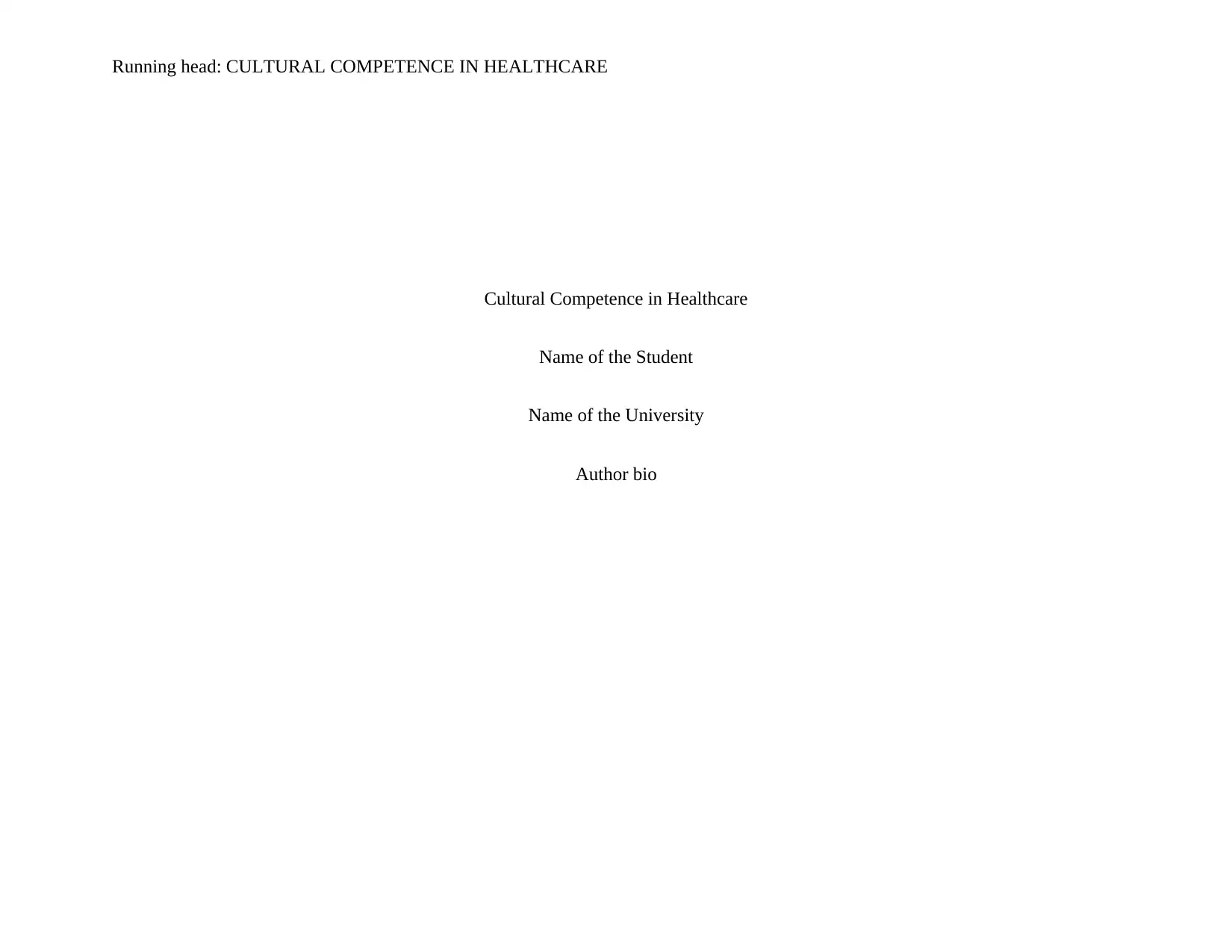
Running head: CULTURAL COMPETENCE IN HEALTHCARE
Cultural Competence in Healthcare
Name of the Student
Name of the University
Author bio
Cultural Competence in Healthcare
Name of the Student
Name of the University
Author bio
Paraphrase This Document
Need a fresh take? Get an instant paraphrase of this document with our AI Paraphraser
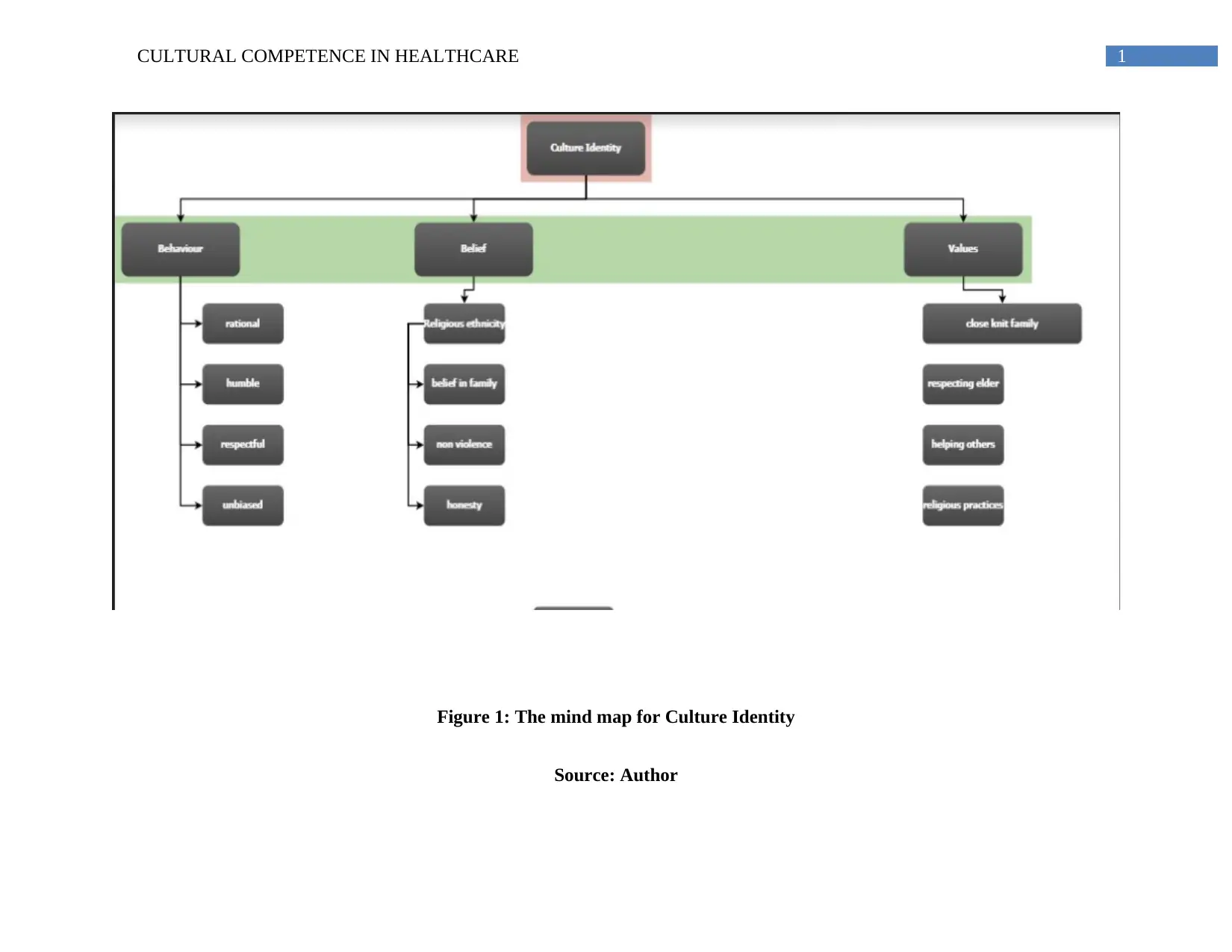
1CULTURAL COMPETENCE IN HEALTHCARE
Figure 1: The mind map for Culture Identity
Source: Author
Figure 1: The mind map for Culture Identity
Source: Author
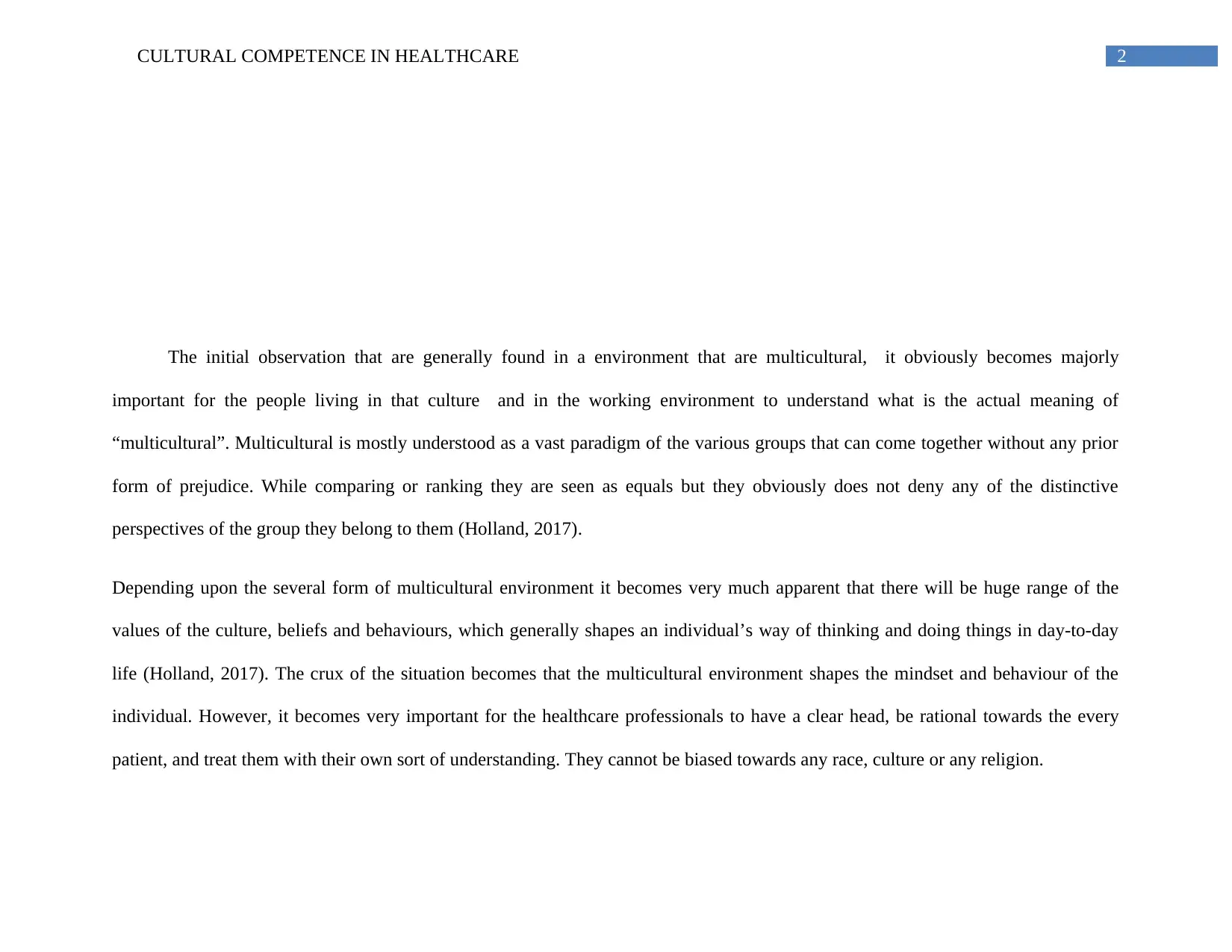
2CULTURAL COMPETENCE IN HEALTHCARE
The initial observation that are generally found in a environment that are multicultural, it obviously becomes majorly
important for the people living in that culture and in the working environment to understand what is the actual meaning of
“multicultural”. Multicultural is mostly understood as a vast paradigm of the various groups that can come together without any prior
form of prejudice. While comparing or ranking they are seen as equals but they obviously does not deny any of the distinctive
perspectives of the group they belong to them (Holland, 2017).
Depending upon the several form of multicultural environment it becomes very much apparent that there will be huge range of the
values of the culture, beliefs and behaviours, which generally shapes an individual’s way of thinking and doing things in day-to-day
life (Holland, 2017). The crux of the situation becomes that the multicultural environment shapes the mindset and behaviour of the
individual. However, it becomes very important for the healthcare professionals to have a clear head, be rational towards the every
patient, and treat them with their own sort of understanding. They cannot be biased towards any race, culture or any religion.
The initial observation that are generally found in a environment that are multicultural, it obviously becomes majorly
important for the people living in that culture and in the working environment to understand what is the actual meaning of
“multicultural”. Multicultural is mostly understood as a vast paradigm of the various groups that can come together without any prior
form of prejudice. While comparing or ranking they are seen as equals but they obviously does not deny any of the distinctive
perspectives of the group they belong to them (Holland, 2017).
Depending upon the several form of multicultural environment it becomes very much apparent that there will be huge range of the
values of the culture, beliefs and behaviours, which generally shapes an individual’s way of thinking and doing things in day-to-day
life (Holland, 2017). The crux of the situation becomes that the multicultural environment shapes the mindset and behaviour of the
individual. However, it becomes very important for the healthcare professionals to have a clear head, be rational towards the every
patient, and treat them with their own sort of understanding. They cannot be biased towards any race, culture or any religion.
⊘ This is a preview!⊘
Do you want full access?
Subscribe today to unlock all pages.

Trusted by 1+ million students worldwide
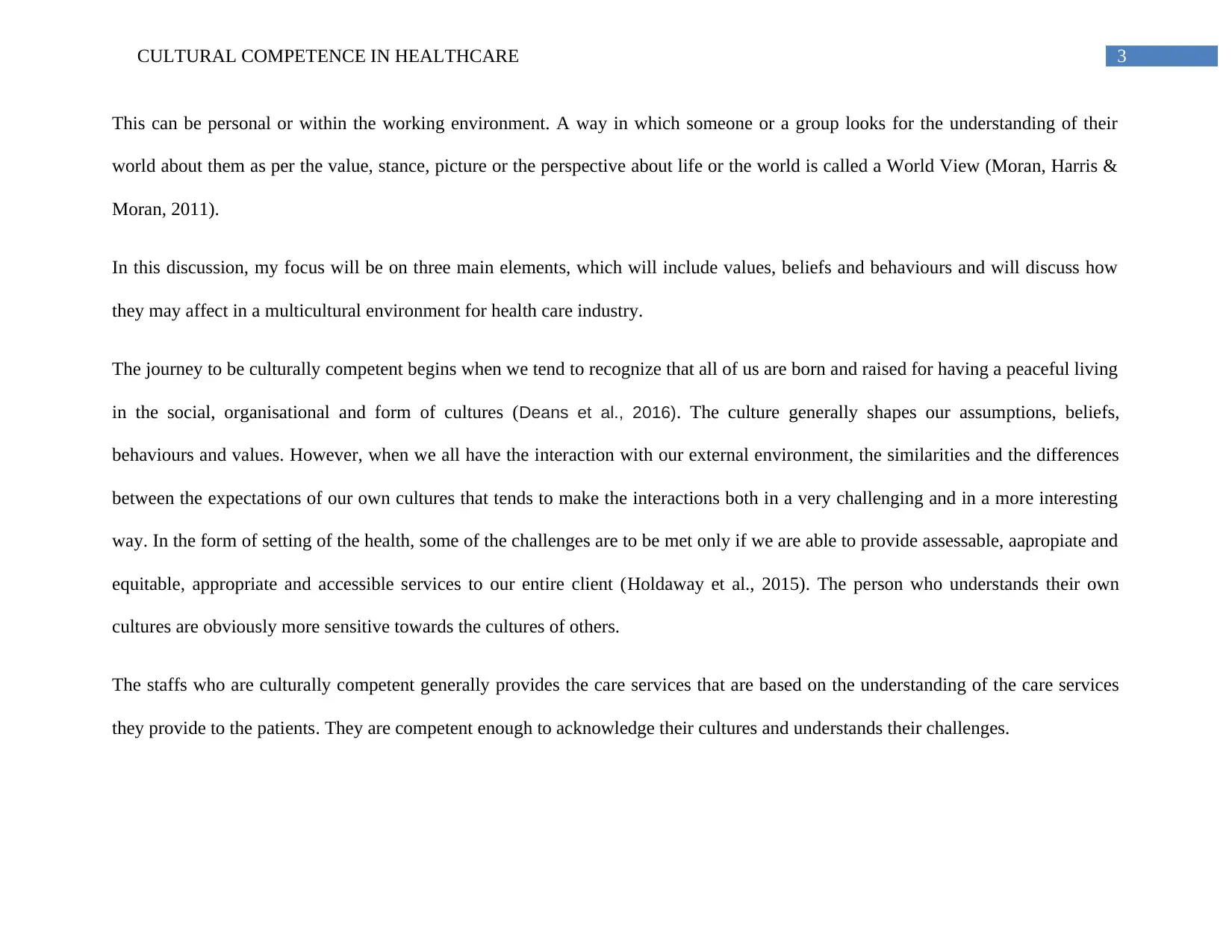
3CULTURAL COMPETENCE IN HEALTHCARE
This can be personal or within the working environment. A way in which someone or a group looks for the understanding of their
world about them as per the value, stance, picture or the perspective about life or the world is called a World View (Moran, Harris &
Moran, 2011).
In this discussion, my focus will be on three main elements, which will include values, beliefs and behaviours and will discuss how
they may affect in a multicultural environment for health care industry.
The journey to be culturally competent begins when we tend to recognize that all of us are born and raised for having a peaceful living
in the social, organisational and form of cultures (Deans et al., 2016). The culture generally shapes our assumptions, beliefs,
behaviours and values. However, when we all have the interaction with our external environment, the similarities and the differences
between the expectations of our own cultures that tends to make the interactions both in a very challenging and in a more interesting
way. In the form of setting of the health, some of the challenges are to be met only if we are able to provide assessable, aapropiate and
equitable, appropriate and accessible services to our entire client (Holdaway et al., 2015). The person who understands their own
cultures are obviously more sensitive towards the cultures of others.
The staffs who are culturally competent generally provides the care services that are based on the understanding of the care services
they provide to the patients. They are competent enough to acknowledge their cultures and understands their challenges.
This can be personal or within the working environment. A way in which someone or a group looks for the understanding of their
world about them as per the value, stance, picture or the perspective about life or the world is called a World View (Moran, Harris &
Moran, 2011).
In this discussion, my focus will be on three main elements, which will include values, beliefs and behaviours and will discuss how
they may affect in a multicultural environment for health care industry.
The journey to be culturally competent begins when we tend to recognize that all of us are born and raised for having a peaceful living
in the social, organisational and form of cultures (Deans et al., 2016). The culture generally shapes our assumptions, beliefs,
behaviours and values. However, when we all have the interaction with our external environment, the similarities and the differences
between the expectations of our own cultures that tends to make the interactions both in a very challenging and in a more interesting
way. In the form of setting of the health, some of the challenges are to be met only if we are able to provide assessable, aapropiate and
equitable, appropriate and accessible services to our entire client (Holdaway et al., 2015). The person who understands their own
cultures are obviously more sensitive towards the cultures of others.
The staffs who are culturally competent generally provides the care services that are based on the understanding of the care services
they provide to the patients. They are competent enough to acknowledge their cultures and understands their challenges.
Paraphrase This Document
Need a fresh take? Get an instant paraphrase of this document with our AI Paraphraser
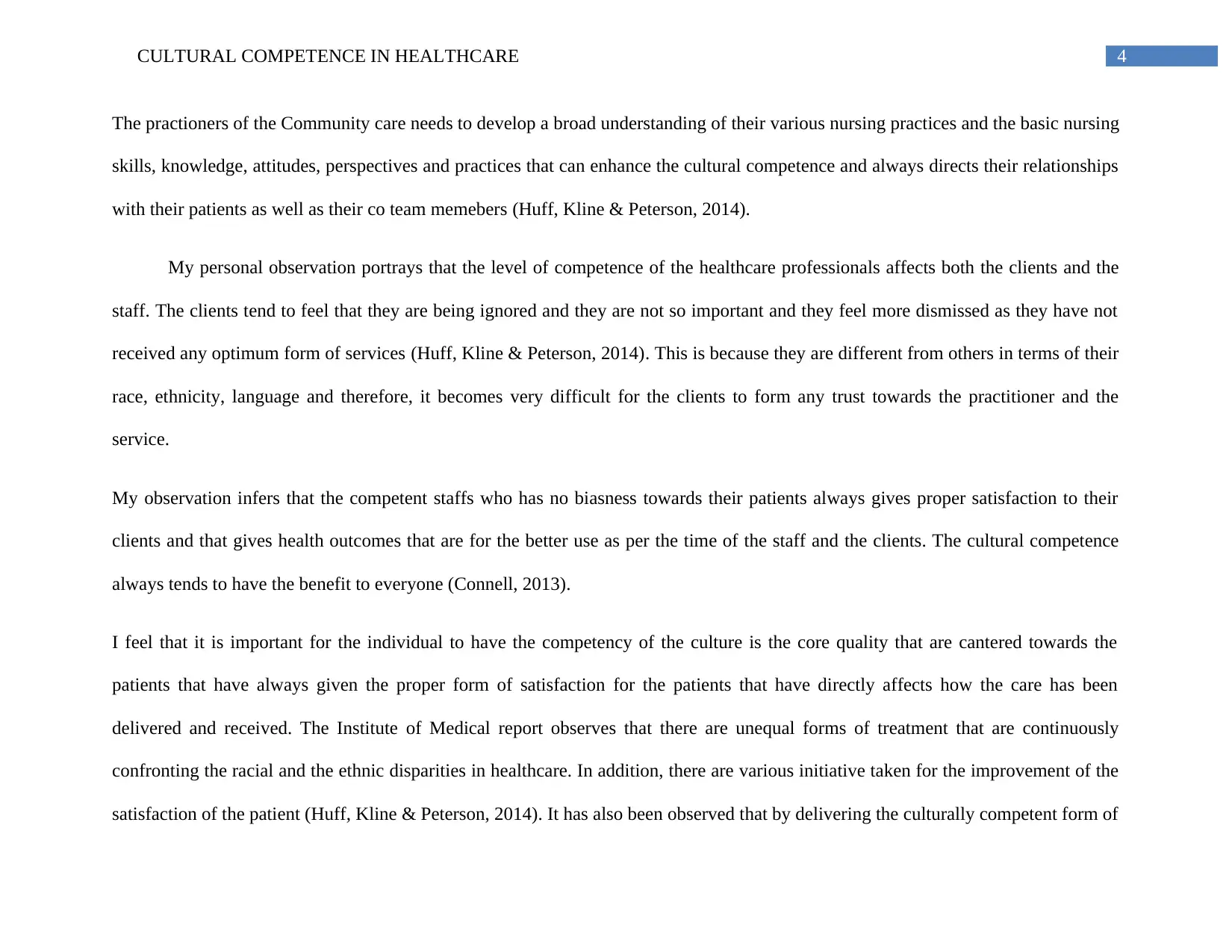
4CULTURAL COMPETENCE IN HEALTHCARE
The practioners of the Community care needs to develop a broad understanding of their various nursing practices and the basic nursing
skills, knowledge, attitudes, perspectives and practices that can enhance the cultural competence and always directs their relationships
with their patients as well as their co team memebers (Huff, Kline & Peterson, 2014).
My personal observation portrays that the level of competence of the healthcare professionals affects both the clients and the
staff. The clients tend to feel that they are being ignored and they are not so important and they feel more dismissed as they have not
received any optimum form of services (Huff, Kline & Peterson, 2014). This is because they are different from others in terms of their
race, ethnicity, language and therefore, it becomes very difficult for the clients to form any trust towards the practitioner and the
service.
My observation infers that the competent staffs who has no biasness towards their patients always gives proper satisfaction to their
clients and that gives health outcomes that are for the better use as per the time of the staff and the clients. The cultural competence
always tends to have the benefit to everyone (Connell, 2013).
I feel that it is important for the individual to have the competency of the culture is the core quality that are cantered towards the
patients that have always given the proper form of satisfaction for the patients that have directly affects how the care has been
delivered and received. The Institute of Medical report observes that there are unequal forms of treatment that are continuously
confronting the racial and the ethnic disparities in healthcare. In addition, there are various initiative taken for the improvement of the
satisfaction of the patient (Huff, Kline & Peterson, 2014). It has also been observed that by delivering the culturally competent form of
The practioners of the Community care needs to develop a broad understanding of their various nursing practices and the basic nursing
skills, knowledge, attitudes, perspectives and practices that can enhance the cultural competence and always directs their relationships
with their patients as well as their co team memebers (Huff, Kline & Peterson, 2014).
My personal observation portrays that the level of competence of the healthcare professionals affects both the clients and the
staff. The clients tend to feel that they are being ignored and they are not so important and they feel more dismissed as they have not
received any optimum form of services (Huff, Kline & Peterson, 2014). This is because they are different from others in terms of their
race, ethnicity, language and therefore, it becomes very difficult for the clients to form any trust towards the practitioner and the
service.
My observation infers that the competent staffs who has no biasness towards their patients always gives proper satisfaction to their
clients and that gives health outcomes that are for the better use as per the time of the staff and the clients. The cultural competence
always tends to have the benefit to everyone (Connell, 2013).
I feel that it is important for the individual to have the competency of the culture is the core quality that are cantered towards the
patients that have always given the proper form of satisfaction for the patients that have directly affects how the care has been
delivered and received. The Institute of Medical report observes that there are unequal forms of treatment that are continuously
confronting the racial and the ethnic disparities in healthcare. In addition, there are various initiative taken for the improvement of the
satisfaction of the patient (Huff, Kline & Peterson, 2014). It has also been observed that by delivering the culturally competent form of
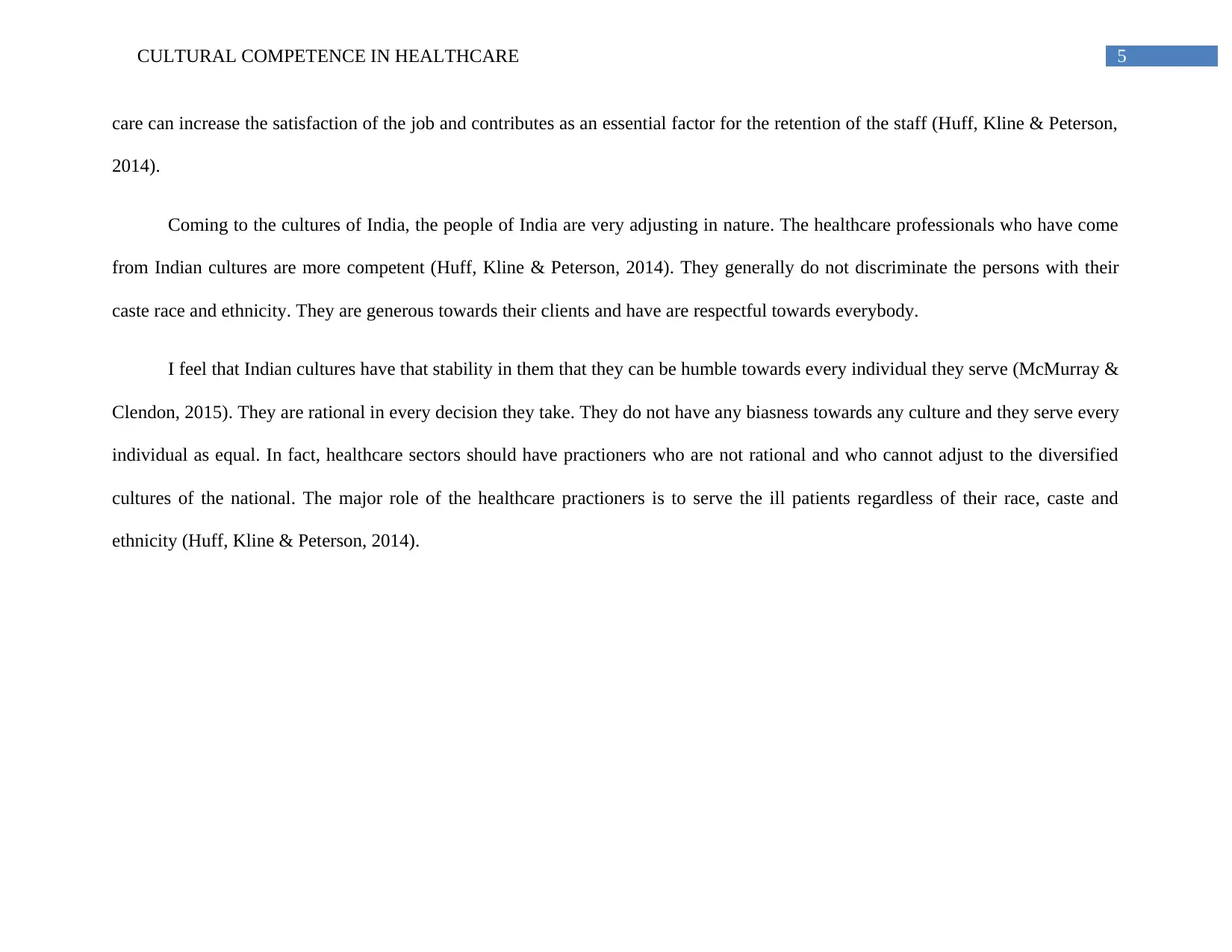
5CULTURAL COMPETENCE IN HEALTHCARE
care can increase the satisfaction of the job and contributes as an essential factor for the retention of the staff (Huff, Kline & Peterson,
2014).
Coming to the cultures of India, the people of India are very adjusting in nature. The healthcare professionals who have come
from Indian cultures are more competent (Huff, Kline & Peterson, 2014). They generally do not discriminate the persons with their
caste race and ethnicity. They are generous towards their clients and have are respectful towards everybody.
I feel that Indian cultures have that stability in them that they can be humble towards every individual they serve (McMurray &
Clendon, 2015). They are rational in every decision they take. They do not have any biasness towards any culture and they serve every
individual as equal. In fact, healthcare sectors should have practioners who are not rational and who cannot adjust to the diversified
cultures of the national. The major role of the healthcare practioners is to serve the ill patients regardless of their race, caste and
ethnicity (Huff, Kline & Peterson, 2014).
care can increase the satisfaction of the job and contributes as an essential factor for the retention of the staff (Huff, Kline & Peterson,
2014).
Coming to the cultures of India, the people of India are very adjusting in nature. The healthcare professionals who have come
from Indian cultures are more competent (Huff, Kline & Peterson, 2014). They generally do not discriminate the persons with their
caste race and ethnicity. They are generous towards their clients and have are respectful towards everybody.
I feel that Indian cultures have that stability in them that they can be humble towards every individual they serve (McMurray &
Clendon, 2015). They are rational in every decision they take. They do not have any biasness towards any culture and they serve every
individual as equal. In fact, healthcare sectors should have practioners who are not rational and who cannot adjust to the diversified
cultures of the national. The major role of the healthcare practioners is to serve the ill patients regardless of their race, caste and
ethnicity (Huff, Kline & Peterson, 2014).
⊘ This is a preview!⊘
Do you want full access?
Subscribe today to unlock all pages.

Trusted by 1+ million students worldwide
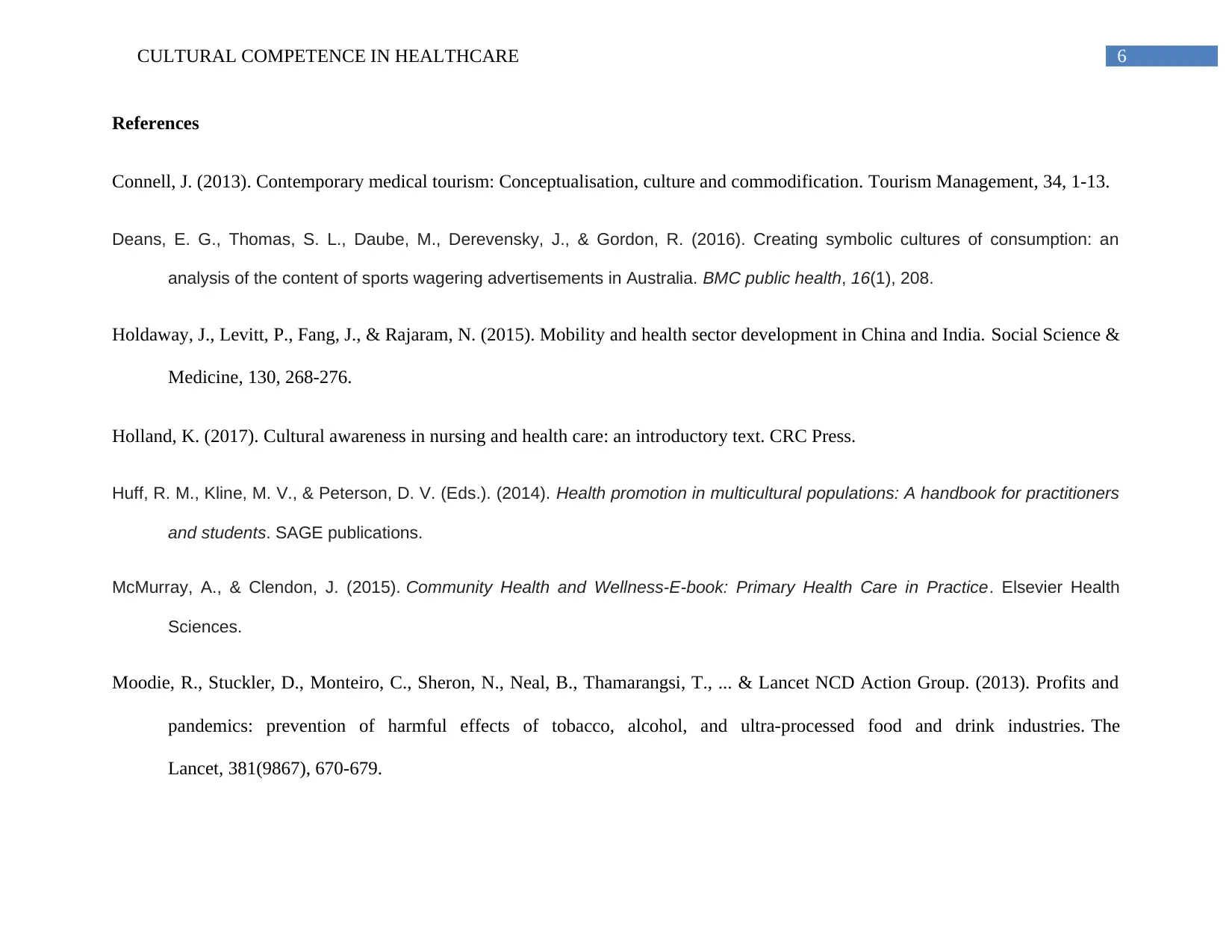
6CULTURAL COMPETENCE IN HEALTHCARE
References
Connell, J. (2013). Contemporary medical tourism: Conceptualisation, culture and commodification. Tourism Management, 34, 1-13.
Deans, E. G., Thomas, S. L., Daube, M., Derevensky, J., & Gordon, R. (2016). Creating symbolic cultures of consumption: an
analysis of the content of sports wagering advertisements in Australia. BMC public health, 16(1), 208.
Holdaway, J., Levitt, P., Fang, J., & Rajaram, N. (2015). Mobility and health sector development in China and India. Social Science &
Medicine, 130, 268-276.
Holland, K. (2017). Cultural awareness in nursing and health care: an introductory text. CRC Press.
Huff, R. M., Kline, M. V., & Peterson, D. V. (Eds.). (2014). Health promotion in multicultural populations: A handbook for practitioners
and students. SAGE publications.
McMurray, A., & Clendon, J. (2015). Community Health and Wellness-E-book: Primary Health Care in Practice. Elsevier Health
Sciences.
Moodie, R., Stuckler, D., Monteiro, C., Sheron, N., Neal, B., Thamarangsi, T., ... & Lancet NCD Action Group. (2013). Profits and
pandemics: prevention of harmful effects of tobacco, alcohol, and ultra-processed food and drink industries. The
Lancet, 381(9867), 670-679.
References
Connell, J. (2013). Contemporary medical tourism: Conceptualisation, culture and commodification. Tourism Management, 34, 1-13.
Deans, E. G., Thomas, S. L., Daube, M., Derevensky, J., & Gordon, R. (2016). Creating symbolic cultures of consumption: an
analysis of the content of sports wagering advertisements in Australia. BMC public health, 16(1), 208.
Holdaway, J., Levitt, P., Fang, J., & Rajaram, N. (2015). Mobility and health sector development in China and India. Social Science &
Medicine, 130, 268-276.
Holland, K. (2017). Cultural awareness in nursing and health care: an introductory text. CRC Press.
Huff, R. M., Kline, M. V., & Peterson, D. V. (Eds.). (2014). Health promotion in multicultural populations: A handbook for practitioners
and students. SAGE publications.
McMurray, A., & Clendon, J. (2015). Community Health and Wellness-E-book: Primary Health Care in Practice. Elsevier Health
Sciences.
Moodie, R., Stuckler, D., Monteiro, C., Sheron, N., Neal, B., Thamarangsi, T., ... & Lancet NCD Action Group. (2013). Profits and
pandemics: prevention of harmful effects of tobacco, alcohol, and ultra-processed food and drink industries. The
Lancet, 381(9867), 670-679.
Paraphrase This Document
Need a fresh take? Get an instant paraphrase of this document with our AI Paraphraser
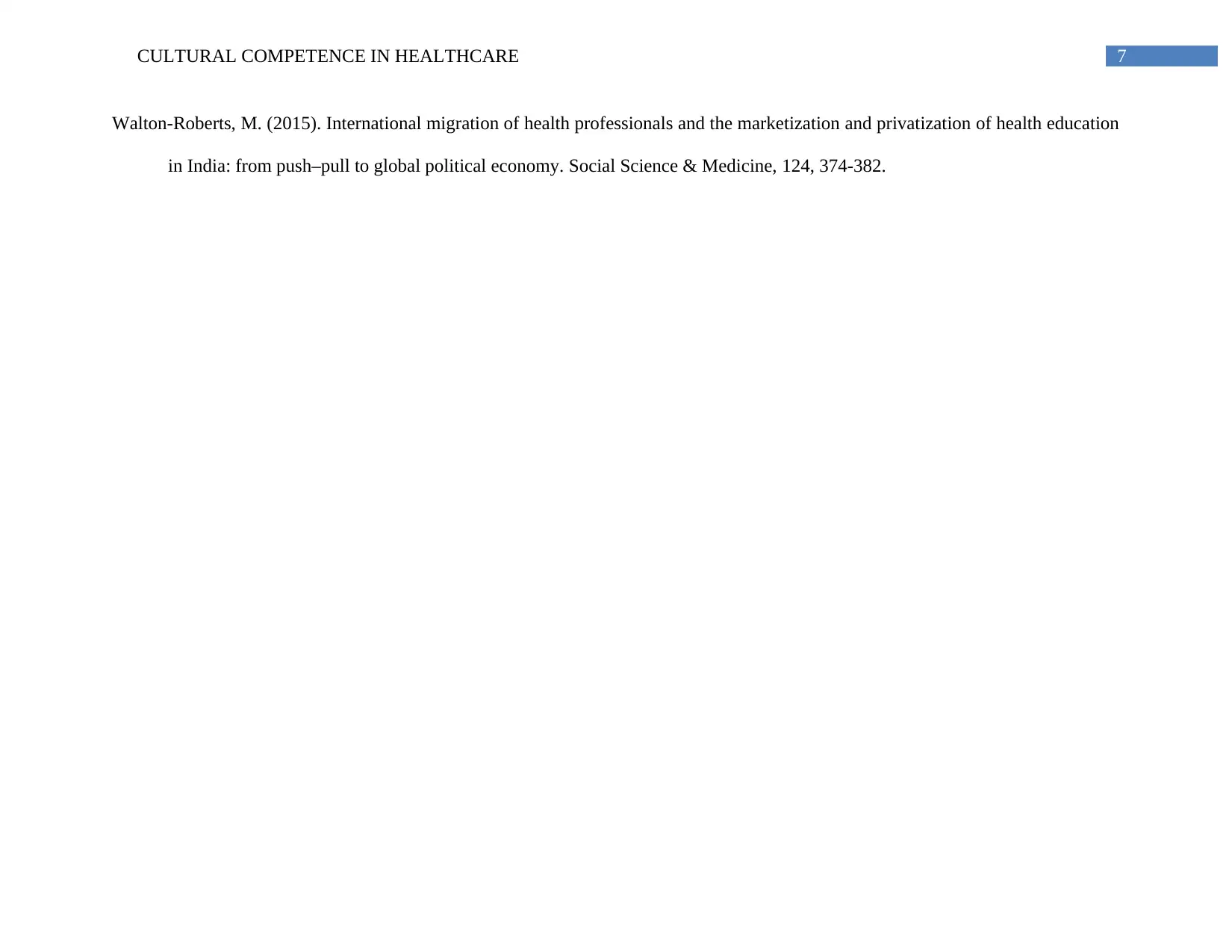
7CULTURAL COMPETENCE IN HEALTHCARE
Walton-Roberts, M. (2015). International migration of health professionals and the marketization and privatization of health education
in India: from push–pull to global political economy. Social Science & Medicine, 124, 374-382.
Walton-Roberts, M. (2015). International migration of health professionals and the marketization and privatization of health education
in India: from push–pull to global political economy. Social Science & Medicine, 124, 374-382.
1 out of 8
Related Documents
Your All-in-One AI-Powered Toolkit for Academic Success.
+13062052269
info@desklib.com
Available 24*7 on WhatsApp / Email
![[object Object]](/_next/static/media/star-bottom.7253800d.svg)
Unlock your academic potential
Copyright © 2020–2026 A2Z Services. All Rights Reserved. Developed and managed by ZUCOL.




